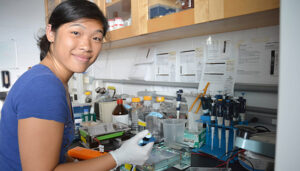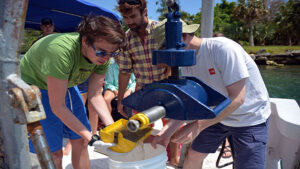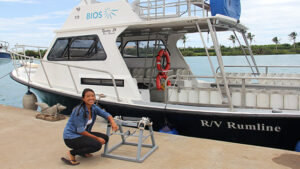New Programs at BIOS Pair Lehigh Students with Real-world Research Problems

Lehigh International Intern Sarah Wu mastered many new laboratory techniques as she characterized microbial communities from shallow-water reefs and the open ocean.
Students from many disciplines can hone career skills, broaden perspective, and find inspiration at BIOS
When pioneering industrialist Asa Packer founded Lehigh University, his vision of providing an education “purposeful in its intent and practical in its application” was inspired by the needs he saw in a rapidly evolving marketplace and interconnected world. 150 years later, Dr. Mark Orrs directs Lehigh’s popular Sustainable Development Program and notes that while the times have changed, the two unique signatures of education at Lehigh – commitment to interdisciplinary education, and the application of knowledge – are strong as ever at the school. In fact, they are at the foundation of Lehigh’s growing collaborations with BIOS.
BIOS trustee and Lehigh alum Jim Stanard is credited with introducing these two like-minded institutions, and last year the relationship flourished with an innovative wave energy educational program developed and implemented by Orrs’ Sustainable Development students. Since then, the collaboration has taken root in University Programs at BIOS through a variety of new and expanding programs for Lehigh students.
Sustainability and the Sea
Considering the abundance of sun, wind, and waves in Bermuda, developing better ways to harness renewable energy resources like these could be a boon to islanders and the environment. When Lehigh researchers received a CyberSEES National Science Foundation grant focused on “seeing the potential of wave energy come to fruition through technological advancements and innovation,” Orrs thought the educational component required by the grant would be a great challenge for students in his Sustainable Development class, and Bermuda an ideal study site.
During spring semesters, Orrs pairs students from Lehigh’s three undergraduate colleges with a partner organization to actively work on some aspect of sustainable development. They often travel internationally to meet stakeholders and put their plan into action. So in early 2014, a four-person “Lehigh in Bermuda” team was assembled. These business, economics and engineering majors made a recon trip to BIOS and then quickly started researching wave energy and applying what they learned to develop a curriculum and recruit high school students.
In June 2015, the Lehigh team brought nine American high-school students from nearby Newark Academy and Moravian Academy to experience a week of hands-on learning at BIOS. A Bermudian high school student involved in BIOS’s Ocean Academy educational programs was also selected to join the group, further expanding the exchange of ideas between students. Between snorkeling trips and working with a model wave energy converter, the students thoroughly enjoyed taking concepts from the lecture hall into the real world.
“We’ve gotten tremendous feedback from the high school students, including demand for another trip to be offered,” said Orrs.
Health, Medicine and Society students arrive for Oceans and Human Health course
Dr. Kelly Austin, the Director of Lehigh’s interdisciplinary Health, Medicine and Society Program, came to BIOS last May to observe the three-week Oceans and Human Health Course offered to Furman University students at BIOS every other year. Austin saw firsthand how the students were able to participate in lab, lecture and fieldwork. Now, BIOS scientists Andrea Bodnar and Andrew Peters are collaborating with Lehigh faculty to offer a similar course for Lehigh students in alternating years.

Students from BIOS’s Ocean and Human Health course collect sediment from local bays to analyze.
“When I arrived, Andrea was talking about the history of using marine species for medicine, and as a social scientist that really grabbed me,” said Austin, whose own research focuses on how climate change contributes to the spread of malaria. She is keenly interested in helping students in the Health, Medicine and Society program understand the nexus between environment and human health. The Oceans and Human Health course covers elements of water and air quality, toxicology, and novel drug development from marine species, and exposes students to cutting-edge technology and research methods that are applicable within a wide range of fields.
“In our Health, Medicine and Society program we have 235 students, one half of which are on the premed track. Their schedules are booked with labs, so logistically they are not the typical student who can take a whole semester abroad. The fact that this is a summer course, with a unique lab component that can help them satisfy their degree requirements, is a big advantage for our students.”
Applied research opportunities at BIOS for Lehigh’s International Interns
Last summer BIOS welcomed Diana Yeh and Sarah Wu through Lehigh’s Iacocca International Internship Program, which supports students with fellowships to participate in internship experiences around the world. Working with Carol Ham, Director of the Program at Lehigh, BIOS’s Director of University Programs, Dr. Penny Barnes, recruited faculty mentors to ensure an optimal match between the research interests of the student and the scientist’s research program at BIOS.
Lehigh student Sarah Wu spent her summer working with microbial oceanographer Rachel Parsons comparing the microbial communities on shallow-water reefs with communities in the open water of the deep ocean. “Having nearly no background in marine biology before this, I was really eager to just learn, and familiarize myself with the many techniques and protocols typical of a microbial lab,” said Wu. By using epifluorescence microscopy, DNA extraction, polymerase chain reaction, and fragment analysis techniques on water samples collected from twelve different sites, Wu boosted her scientific knowledge while also contributing important data addressing the broader research question.
“BIOS has opened doors for me,” Wu said. “Under the patience and guidance of my mentors and fellow interns, I have learned many skills, techniques, and protocols which I may take into my next experience whether it be a job, internship, or further schooling.”
Diana Yeh similarly honed her skills working with BIOS researcher Tim Noyes to analyse the fish species inhabiting deep reefs. Because these sites exceed the limits of conventional SCUBA, the fish communities remain relatively unstudied. By studying video footage from baited remote underwater video cameras, Diana could identify species that were indicative of ecosystem health and target fish species that may need increased protection through management practices.

Lehigh International Intern Diana Yeh helped deploy Baited Remote Underwater Video systems to record fish diversity on deep reefs.
“My internship has taught me many things such as research skills, time management, and public speaking, to name a few,” said Yeh. “This will definitely help me down the road if I decide to go into research as a career path and even back at university.”
Based on the successful experiences of the 2015 interns, Barnes and her colleagues at Lehigh spent time this winter working to ensure that Lehigh students can come for hands-on research experience at BIOS in 2016. Keep an eye out for them this summer!
